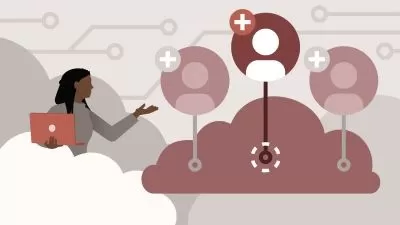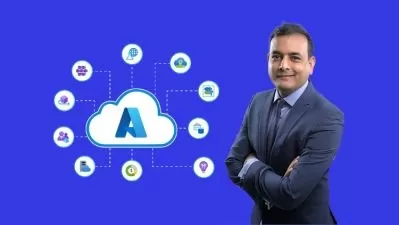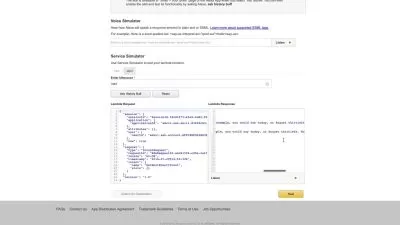Cloud Data Warehouse Concepts
Sid Inf
2:16:05
Description
The beginner's guide to Cloud Data Warehouse
What You'll Learn?
- Basics of the cloud and cloud computing
- Basics of Cloud Data Warehouses
- Different non traditional Data Sources which are needed to Enterprises
- How could the Cloud Technology help with the Cloud Data Warehouse?
- What are the benefits to an Enterprise to move on to a Cloud Data Warehouse?
- What are the current popular Cloud Data Warehouse providers in the market now?
- On what basis should we consider to move from a traditional Data Warehouse to a Cloud Data Warehouse
- What are the common use cases we should consider when considering the option of Cloud Data Warehouse?
- List of latest ETL tools for Cloud Data Warehouses
- List of latest Reporting tools for Cloud Data Warehouses
Who is this for?
What You Need to Know?
More details
Description‘The Cloud’ or ‘Cloud computing’ is one of the hottest buzzwords in technology. It appears more than 48 million times on the Internet search every day. Cloud computing and software-as-a-service (SaaS) have been around for quite some time now and we have been using it via multiple applications both at work and personally via mobile apps.
But when it comes to the data warehouse on a cloud, the concept or the idea has recently emerged as an alternative to conventional or traditional, on-premises data warehousing and similar types of solutions which we have been working on.
When choosing a DW solution for the first time, the very first consideration is typically one between an on-prem DW or a cloud-based one. And while a lot of folks new to the Data Warehouse domain go straight to the cloud these days because it is faster, easier and pay as you go or use method of pricing, the scalable features and the quick turnaround time on multiple aspects. Not that the Cloud is one stop solution for all Data Warehouse needs and there are still many reasons why an organization might want to choose an on-prem solution.
Even now there are a lot of projects/implementations which are maintaining and enhancing the traditional data warehouses on a daily basis. And, lot of projects and team members are also dealing with issues with different kinds of sources, the increase in volumes of data and the outburst of new requirements from business and analytics to see the real value of the unstructured formats of data.
I’m here to help you on your journey to understand the basics of ‘Cloud’ and the Cloud Data Warehouse. We would take little baby steps and go slow and easy, so you can learn more about what the cloud Data Warehouse really is and make sure that you’ll understand the cloud Data Warehouse by the time you finish with this course.
We will take examples of our day to day use of applications like Facebook, Netflix, Google Maps etc to learn more and understand better.
Who this course is for:
- Any body interested in learning the basics of 'the cloud;, 'Cloud Computing' and the 'Cloud Data Warehouse'
- Data Warehouse and Business Intelligence Professionals
- ETL Developers ( Informatica Power Center, IBM DataStage, Pentaho, Talend etc)
- Data Analysts
- Business Analysts
‘The Cloud’ or ‘Cloud computing’ is one of the hottest buzzwords in technology. It appears more than 48 million times on the Internet search every day. Cloud computing and software-as-a-service (SaaS) have been around for quite some time now and we have been using it via multiple applications both at work and personally via mobile apps.
But when it comes to the data warehouse on a cloud, the concept or the idea has recently emerged as an alternative to conventional or traditional, on-premises data warehousing and similar types of solutions which we have been working on.
When choosing a DW solution for the first time, the very first consideration is typically one between an on-prem DW or a cloud-based one. And while a lot of folks new to the Data Warehouse domain go straight to the cloud these days because it is faster, easier and pay as you go or use method of pricing, the scalable features and the quick turnaround time on multiple aspects. Not that the Cloud is one stop solution for all Data Warehouse needs and there are still many reasons why an organization might want to choose an on-prem solution.
Even now there are a lot of projects/implementations which are maintaining and enhancing the traditional data warehouses on a daily basis. And, lot of projects and team members are also dealing with issues with different kinds of sources, the increase in volumes of data and the outburst of new requirements from business and analytics to see the real value of the unstructured formats of data.
I’m here to help you on your journey to understand the basics of ‘Cloud’ and the Cloud Data Warehouse. We would take little baby steps and go slow and easy, so you can learn more about what the cloud Data Warehouse really is and make sure that you’ll understand the cloud Data Warehouse by the time you finish with this course.
We will take examples of our day to day use of applications like Facebook, Netflix, Google Maps etc to learn more and understand better.
Who this course is for:
- Any body interested in learning the basics of 'the cloud;, 'Cloud Computing' and the 'Cloud Data Warehouse'
- Data Warehouse and Business Intelligence Professionals
- ETL Developers ( Informatica Power Center, IBM DataStage, Pentaho, Talend etc)
- Data Analysts
- Business Analysts
User Reviews
Rating
Sid Inf
Instructor's Courses
Udemy
View courses Udemy- language english
- Training sessions 36
- duration 2:16:05
- English subtitles has
- Release Date 2024/05/04










